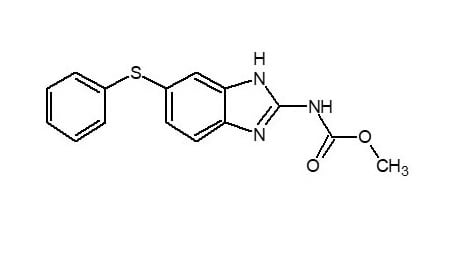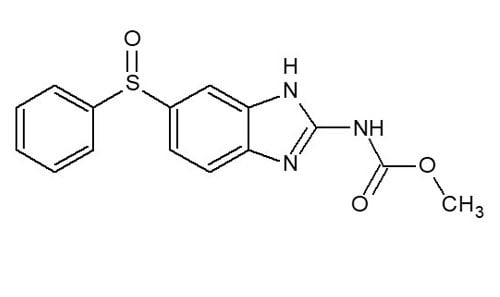Ricobendazole [CAS No. : 54029-12-8]
| CAS Number | 54029-12-8 |
|---|---|
| Type Of API | Veterinary Medicine Raw Material / Pharmaceutical Intermediates |
| Chemical Name | RICOBENDAZOLE |
| Usage/Application | Industrial |
| Grade Standard | Technical Grade |
Description
Ricobendazole is a veterinary anthelmintic compound also known as wormer belonging to the chemical class of the benzimidazoles. It is moderately used in livestock. It is used mainly in cattle and scarcely in sheep and goats. It is administered in the form of injectables and drenches. It is marginally used in dogs and cats either as drenches or tablets, pills, etc.
Ricobendazole mode of operation:
The molecular mode of operation of Ricobendazole, consists in binding to tubulin, a structural protein of microtubules. The primary functions of Microtubules are creating the motility, the division, and the secretion processes of cells in all living organisms. Ricobendazole blocks the microtubules in the worms perturbing the uptake of glucose and blocking the whole energy management mechanism of the worms resulting in paralyzed, died, or expelled worms.
Synonyms of Ricobendazole
Ricobendazole is also knows as Albendazole oxide, Albendazole sulfoxide, Methyl [5-(propane-1-sulfinyl)-1H-benzoimidazol-2-yl]-carbamate.
Ricobendazole active ingredients:
Ricobendazole is an injectable benzimidazole. Chemically Ricobendazole is albendazole sulfoxide.
Ricobendazole and Animal diseases:
Ricobendazole is effective against gastrointestinal lungworms and roundworms in livestock, including L4-larvae of the genus Cooperia, Nematodirus, Bunostomum, Haemonchus, Chabertia, Ostertagia-Teladorsagia, Trichuris, Dictyocaulus, Trichostrongylus, Oesophagostomum, etc. It is also effective against the arrested larvae of several species. It works effectively against most livestock tapeworms like Moniezia and adult liver flukes like Fasciola hepatica and Fascioloides magna. Ricobendazole is ineffective against immature stages of parasites. It is also effective against Ancylostoma, Toxocara, Trichuris, Uncinaria, the major parasitic roundworms of dogs and cats.
Ricobendazole benefits/effectiveness/results:
Ricobendazole has a limited residual effect. A single administration in ruminants, will kill the parasites present in the host at the time of treatment and protect against re-infestations for a short time. This drug is not effective in the long term. In non-ruminants, the residual effect is only for a few hours.
Ricobendazole is not effective against external parasites. When injected, Ricobendazole is rapidly absorbed into the bloodstream of an animal. Maximum plasma levels are reached about 5 hours after the drug administration. It is quickly distributed throughout the whole body and appears also in the abomasum, where it is partly reduced to albendazole. Ruminants excrete the drug mainly through urine, in the form of the parent molecule or various metabolites. Ricobendazole disturbs cell division, worm egg production, and development. Ricobendazole also inhibits a helminth-specific fumarate reductase, an enzyme involved in the energy management of the worm cells.
| Physical Form | Powder |
|---|---|
| Ingredients | Animal Extract |
| Storage Instructions | Dry Place |
| Packaging Size | Any |
| Packaging Type: | Bag/Carton/Drum |
| Color / Appearance | White to faintly yellowish powder. |
| Purity | 99 % Pure |
| Iupac Name | Methyl N-(6-propylsulfinyl-1H-benzimidazol-2-yl)carbamate |
| Molecular Formula | C12H15N3O3S |
| Molecular Weight | 281.33 g/mol |
| Melting Point | 218.93 °C |
| Solubility | Soluble in formic acid, & in acetic acid. |



![Ricobendazole [CAS No. : 54029-12-8]](https://heallifesciences.com/wp-content/uploads/2023/08/Ricobendazole-API.jpg)
![BRINZOLAMIDE [CAS No. 138890-62-7]](https://heallifesciences.com/wp-content/uploads/2024/07/Brinzolamide-CAS-138890-62-7-300x300.jpg)
![Ambroxol Hydrochloride [CAS NO. : 23828-92-4]](https://heallifesciences.com/wp-content/uploads/2023/08/Ambroxol-hydrochloride-300x300.jpg)
![Febuxostat [CAS No.: 144060-53-7]](https://heallifesciences.com/wp-content/uploads/2023/08/Febuxostat-API-300x300.jpg)